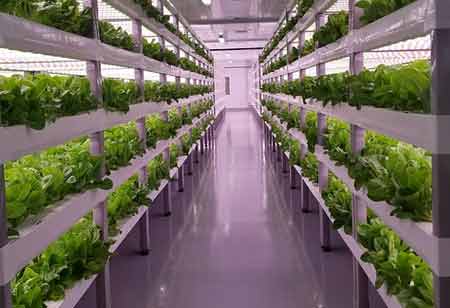

Thank you for Subscribing to Agri Business Review Weekly Brief

The advantages of vertical farming include reliable crop production all year long, efficient use of space, water conservation, and environmental friendliness.
With the growing population, space is becoming more and more of a concern. As a result, things like houses, interior designs, and gardens are becoming more vertical. Farms are becoming a larger version of gardens. It takes up less space than a field and a greenhouse.
Vertical farms are plants stacked in layers, usually integrated into buildings like shipping containers, skyscrapers, and warehouses. A vertical farm produces food in the same way as a conventional farm.
It also relies less on the sun and weather, as it leverages controlled environment agriculture technology. A well-regulated climate inside the farm will allow you to grow food or medicine without worrying about temperature, humidity, or moisture.
Vertical farming aims to produce more crops in a smaller area. To maintain the perfect light level in the room, towers filled with cultivated crops and a combination of natural and artificial lights are needed. Occasionally, rotating beds are used to improve lighting efficiency.
Peat moss, coconut husks, and other non-soil mediums are more common than aeroponics and hydroponics. These types of farming use feature to offset the energy cost of farming, making it more sustainable and conservable. As a result, is that water consumption is reduced by up to 95 percent.
Some of the significant benefits of vertical farms are described below:
Smaller places have an endless supply of food: By 2050, 80 percent of the world's population will live in urban areas with the increasing food demand. Traditional farming methods won't be able to meet the demands, so vertical farming will play a significant role in helping to prepare for such a situation.
Vertical farming allows farmers to produce the equivalent of 4 to 6 acres on just 1 acre. According to rough calculations, a 30-story building of 5 acres can produce the equivalent of 2.400 acres of horizontal farming. Due to the advanced technology used in the facilities, the farmers can grow crops continuously all year round.
There will be no more bad weather: In farming, plant health and crop qualities are very important. The farmers are going to have a bad time harvesting if something goes wrong. Natural crises like cyclones, floods, or severe droughts can easily affect crops.
Due to global warming, moving those plants indoors will significantly mitigate unwanted consequences. Throughout the year, farmers will also have a great deal of certainty about harvesting.
The best of conservation: Vertical farming also saves a great deal of water. In vertical farming, crops can be grown with 70 to 95 percent less water than in conventional cultivation. Among other things, conventional farmers use drip irrigation, rotational grazing, and crop covering to conserve water. However, the conservation amount and results will not be as good.
Consumers are getting more organic stuff: This advantage, however, is not available in every part of the world. Shipping costs are high, and it's not exactly eco-friendly since there are more carbon footprints associated with transportation.
Surely that won't happen too often if vertical farmers are on the rise. It is possible to enjoy healthier food and lifestyles. In vertical farming, no chemical pesticides are used, which can pollute water, soil, and air. Farmers won't use it, so consumers won't have health risks, and the environment will be healthier.
Occupational hazards are reduced: Hazards are frequently encountered by traditional farmers. The heavy farming equipment they use can expose them to diseases like malaria and accidents. Poisonous chemicals within the farming area are also a danger to them. Vertical farming indoors will keep farmers safe from constant dangers.

However, if you would like to share the information in this article, you may use the link below:
https://www.agribusinessreviewapac.com/cxoinsight/key-advantages-of-vertical-farming-nwid-796.html